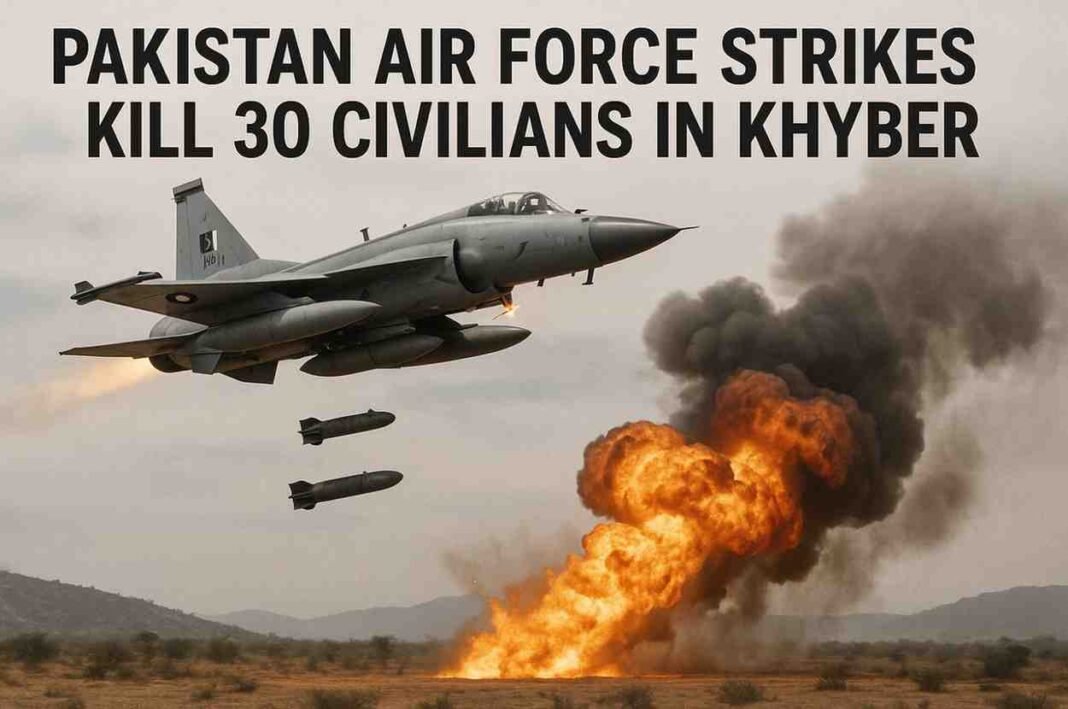Massacre in Tirah Valley
In a devastating incident, at least 30 people, including women and children, were killed when the Pakistan Air Force (PAF) launched airstrikes on Matre Dara village in the Tirah Valley of Khyber Pakhtunkhwa province early Monday morning. According to reports, the air raid took place around 2 am, when PAF fighter jets dropped eight LS-6 precision-guided bombs on the village, triggering large-scale destruction and civilian casualties.
Eyewitnesses described scenes of horror, with families buried under rubble, homes reduced to ashes, and bodies of children scattered across the village streets. Rescue teams rushed to the site, struggling to recover survivors and pull out bodies trapped beneath collapsed structures. Officials fear the death toll may rise further as several villagers remain unaccounted for.
Civilians Bear the Brunt
Local residents and human rights activists have strongly condemned the strike, stating that all those killed were civilians with no ties to militant groups. Videos and photographs circulating on social media showed heartbreaking visuals of lifeless children, grieving families, and destroyed homes. Many injured survivors were transported to nearby hospitals, though medical authorities remain uncertain about their chances of survival due to critical injuries.
The latest tragedy underscores the growing risks faced by civilians in conflict-hit Khyber Pakhtunkhwa, where military operations and counter-terror offensives have repeatedly resulted in unintended casualties.
Human Rights Groups Raise Alarm
International rights organizations, including Amnesty International, have long criticized Pakistan for what they describe as a reckless and disproportionate use of force in populated areas. Earlier this year, Amnesty warned that recurrent drone and air strikes in the province demonstrate “an alarming disregard for civilian life.”
“Pakistani authorities have failed to take action to protect civilians in Khyber Pakhtunkhwa, who continue to pay the price of escalating drone and air strikes,” Isabelle Lassee, Amnesty’s Deputy Regional Director for South Asia, stated in June. The latest incident adds to a worrying trend of indiscriminate attacks that have repeatedly claimed innocent lives.
Escalating Violence in the Province
According to data shared by the Khyber Pakhtunkhwa police, the province recorded 605 terror incidents between January and August this year, resulting in the deaths of 138 civilians and 79 police personnel. The month of August alone witnessed 129 separate incidents, including targeted attacks that killed six Pakistan Army soldiers and paramilitary Federal Constabulary troops.
This steady rise in violence highlights the fragile security environment in the region, with militant organizations exploiting the rugged terrain and porous Afghan border to launch attacks.
Massacre by Pakistan once again! More than 30 civilians, including women and children, butchered after Pakistan Air Force dropped 8 bombs on a village in Khyber Pakhtunkhwa. Dark day for its own people. Shameful! pic.twitter.com/zlL45O9p71
— Shesh Paul Vaid (@spvaid) September 22, 2025
Terrorist Bases Shifting Deeper Into Khyber
Security experts warn that groups such as Jaish-e-Mohammed (JeM) and Hizbul Mujahideen (HM) are now relocating their bases deeper into the province, particularly after the Pakistani military’s recent Operation Sindoor destroyed nine major terrorist hideouts across Pakistan and Pakistan-occupied Kashmir.
The mountainous terrain of Khyber Pakhtunkhwa, combined with cross-border connectivity with Afghanistan, provides natural concealment for militants. Many hideouts dating back to the anti-Soviet Afghan war of the 1980s and the U.S.-led invasion of Afghanistan post-9/11 remain active, offering ready-made infrastructure for terrorist groups.
Civilian Voices Silenced Amid Rising Fear
Locals in Tirah Valley report living in constant fear as military operations continue without adequate safeguards to protect innocent lives. Many fear retaliation if they speak out against the government or the armed forces. Families of victims from past strikes often receive little to no compensation, further deepening mistrust between civilians and the state.
Analysts argue that the persistent targeting of civilian areas erodes confidence in the government’s counter-terrorism strategy and risks fueling radicalization instead of curbing it.
Call for Accountability
As the bodies of victims are laid to rest, calls for accountability are intensifying. Civil society groups demand an independent inquiry into the Matre Dara airstrike, stressing that military operations must adhere to international humanitarian law. Critics insist that Pakistan cannot afford to ignore the humanitarian cost of its counter-insurgency campaign.
The tragedy in Tirah Valley serves as yet another grim reminder of the devastating toll of militarization in Khyber Pakhtunkhwa, where civilians continue to suffer amid the crossfire of state and militant violence.








